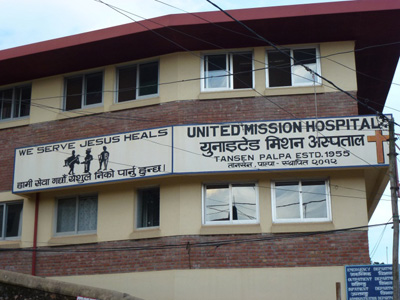
Tansen Mission Hospital is located in the Palpa District of Nepal, 300km west of Kathmandu. It lies 1km east of Tansen bazaar, in the foothills of central Nepal. It was set up over 50 years ago by a couple of Christian physicians who began to treat patients while on a visit to the town; they were later invited back to set up a hospital. The hospital now has 160 inpatient beds, sees over 300 outpatients from the surrounding nine districts every day and employs over 300 local staff, in addition to 10 Christian missionary doctors from seven different countries.
I had several aims for my elective, which guided my decision to go to this particular hospital. Primarily I wished to have the experience of working in a Christian missionary hospital, so that I could decide whether it is a setting where I would like to work in the future. Secondly I was keen to see how medicine is practised differently in the developing world, where finances and resources are limited. Thirdly I was looking forward to the opportunity to further explore potential career choices, especially in obstetrics and gynaecology.
Each day started at 7.45am with a Bible reading, prayers for the hospital and a report from the on-call team. This would be followed by ward rounds. Mid-morning, each doctors team would break for 'chiyaa'; traditional Nepali tea consisting of milk, spices and sugar. This sociable time was considered as important as practising medicine. Most of the doctors spent the rest of the day either in the outpatients department or in theatre. It struck me that many of the patients that come to the hospital have travelled several hours to be seen and will stay in hotels overnight to ensure they are in time to buy an outpatients ticket the next morning – what a contrast to the close-by health facilities we have in the UK! The day generally finished at 5.30.
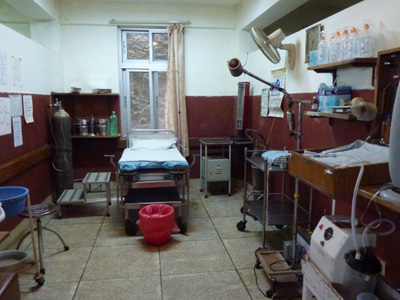
I started my elective by spending three weeks with the obstetrics and gynaecology team. On the ward rounds I was able to examine both the antenatal and postnatal women, as well as the new-borns. In the afternoons I spent time in the female out-patients clinic, observed on the labour ward or went to watch gynaecology surgery. During my time with the team I saw many interesting but sad gynaecology cases. One woman from a particularly remote area had come in complaining of urinary incontinence. She had been in labour for five days, before embarking on a long journey to a health post to have a caesarean section. The pressure on her bladder from such a long labour had caused pressure necrosis, resulting in a hole in her bladder wall. The sad thing is that this could have been prevented if she had had better access to health facilities that are able to offer pregnancy education and emergency care.
The next three weeks I spent with the paediatrics team, on ward rounds and in the children's outpatient clinic. Despite knowing that Tansen Mission Hospital served many poor communities, I was still surprised by the number of severely malnourished children we saw on a daily basis. What made the situation even sadder was that the majority of these children were brought in by mothers who were well-dressed and well-nourished. I began to realise how important social status often is in Nepal, compared with health.My final two weeks I spent on the general medical wards and in the male outpatients clinic. I was expecting to spend a lot of my time seeing tropical diseases, tuberculosis and animal bites, but in fact I saw a lot of COPD and alcohol-related disease, which I didn't expect to be common problems outside the West. In some parts of Nepal, home-brewed alcohol is cheaper than drinking water, so children are raised on it and continue their drinking habit into their adult years. By far the commonest diagnosis made on the medical wards was “partially-treated meningitis”. Patients with a fever would often present at the hospital having been given antibiotics for typhoid/meningitis by a health post, at too low a dose to be effective.
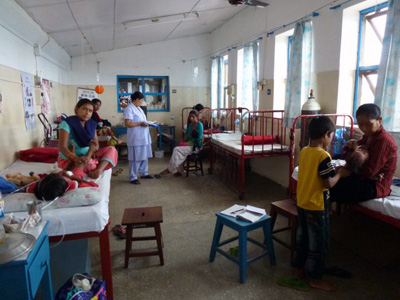
During my time at Tansen I was given the opportunity to spend a day with the social services team. They provide counselling, allocate financial assistance to the poorest patients and go on to the hospital wards to pray for patients individually. They aim to share their faith with patients who are interested. Every day at 12.00 there is an outreach service in the hospital chapel, to which all patients are invited along to hear about Jesus.
The main language of patients seen in the hospital was Nepali. Therefore I took some language lessons to help my understanding on the wards. By the end of eight weeks I had managed to take a few very basic histories in Nepali! However the doctor's language was English, which meant that I could understand all the meetings and medical notes. During my time at Tansen Mission Hospital, I received a lot of teaching from all the doctors on ward rounds and in clinic. I also attended the weekly doctor's tutorials.Aside from the medical work, I was able to attend services at a couple of Nepali churches, which were very different to what I am used to in the UK. Services typically last two hours; the first half is sung worship and the second half consists of a long sermon. Women and men sit separately. One of the churches holds a weekly outreach service in English, and for one of the services I had the privilege of leading the evangelistic talk and discussion.
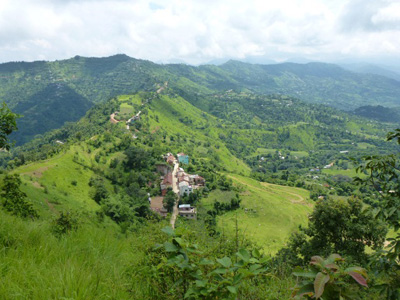
Being located in the foothills of Nepal, an elective in Tansen gave me ample opportunities to go on walks around the area, including to Lumbini - the birthplace of the Buddha - and Ranighat - the “Taj Mahal of Nepal”. I spent some of my evenings with the international doctors, eating and praying together, playing board games and making mo:mos (yummy Nepali dumplings). Every Wednesday afternoon, whether in the middle of the monsoon storm or in the baking heat, there was a game of Sahalu (Finnish hockey). It was great fun!
At the end of time in Tansen I went to Pokhara for a few days, where I had a few days to explore Fewa lake, relax and do a bit of shopping. I also spent some time in Kathmandu, visiting some of the tourist sites.
I encountered very few problems during my elective as there were always people around to ask if I needed help. For about a week I was unwell, but during that time I was well looked after by some of the international doctors. Before leaving the UK I was concerned that the language would be a barrier to my experience or that I would feel lonely spending eight weeks without any other medical students at the hospital. However I encountered neither of these problems. Some students might be disappointed that there aren't many opportunities to get “hands-on” with medicine while in Tansen, as the interns and residents at the hospital take priority when it comes to training. However I was made aware of this before I arrived, so it wasn't an issue for me.
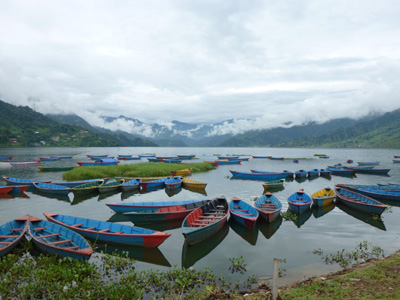
I would recommend this elective to anyone who wishes to experience medicine in a resource-poor setting, from the perspective of a Christian missionary hospital. During my time in Tansen, not only did I learn about and see a lot of medicine that I won't see in the UK, but I began to appreciate how culture and society has such a large impact on decisions made about medical care in Nepal. Having undertaken a missionary training week with BMS World Mission before my elective, I left with an open mind, and as a result learnt a lot about myself and my faith. My time in Nepal has made me realise what a privilege it is to learn medicine; my skills as a doctor could one day help the most-needy people of this world. As a result of all of this, I am now considering working at a Christian missionary hospital once I have qualified.






























